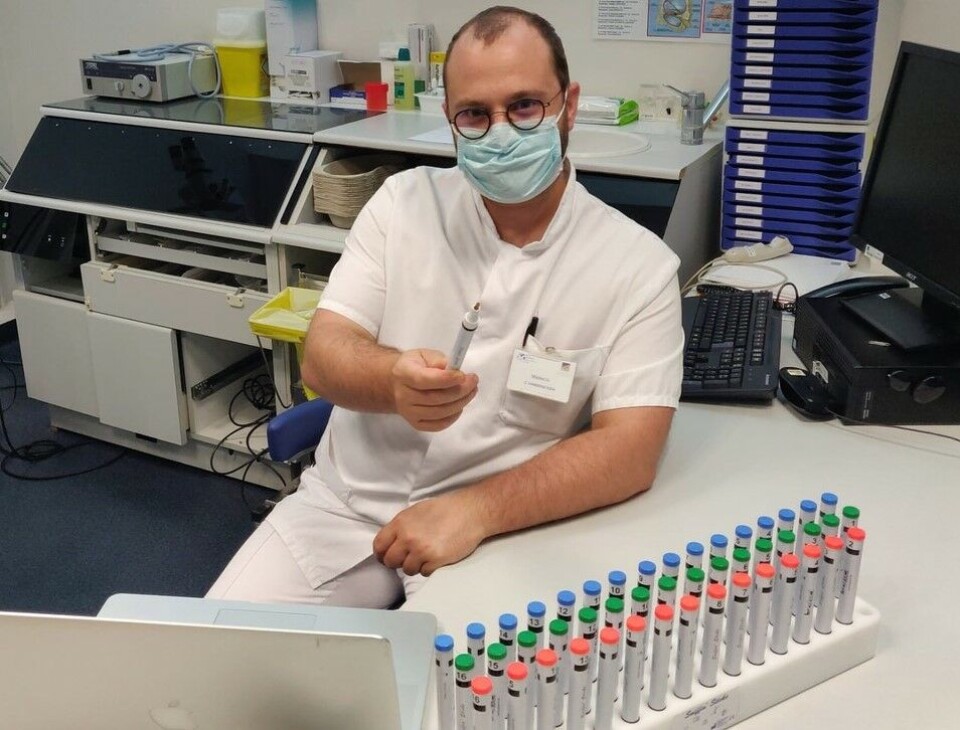-
La Voie Bleue: European Cycle Route of the Year is in France
700km bike path linking Luxembourg and Lyon has been crowned winner of the 2026 title
-
Before and after: Garonne river floods in south-west France
Satellite images show extent of flooding from back-to-back storms in February
-
Home insurance increases expected in France after floods
Compensation costs for the recent storms and flooding across the west and south-west is estimated to be in the billions of euros
The French doctor helping Covid patients to smell the world again
'We love eating, especially here in France, so when chocolate tastes like cigarettes, for example, it can lead to people feeling unhappy or anxious' says Dr Vandersteen, who now routinely sees up to 15 patients

One year ago, Dr Clair Vandersteen might have treated around 10 patients a year for anosmia, the inability to smell.
Now, the ear, nose and throat specialist routinely sees up to 15 patients a week at his clinic at the Centre Hospitalier Universitaire de Nice.
The reason: Covid-19.
Loss of smell is a symptom in eight out of 10 cases and can sometimes linger.
“We have seen a very large increase in patients since this time a year ago,” Dr Vandersteen said.
“In the last studies of Covid patients one year on, it was revealed that 20% of people who lost their sense of smell still had not regained it.
“The patients we see suffering from a loss of smell are relatively young. It is predominantly a problem that affects people in their 30s and 40s.”
While for some people it might seem little more than an inconvenience, Dr Vandersteen warns the condition can make patients anxious and depressed.
“The loss of smell can lead to psychological problems – 30% of people who have lost their sense of smell due to Covid are suffering from some kind of psychological damage. We love eating, especially here in France, so when chocolate tastes like cigarettes, for example, it can lead to people feeling unhappy or anxious.
“If you can’t enjoy the smell of your newborn baby, or the smell of your home, it can be unsettling. It can also be dangerous – if you can’t smell gas or smoke, for example.”
It is for these reasons his team in Nice have come up with a three-pronged plan to help patients rediscover their sense of smell.
Dr Vandersteen works with a speech pathologist and a psychologist in an innovative health pilot scheme.
A multidisciplinary approach is crucial, he says, as Covid-19 is understood to affect the central nervous system, disrupting the perception of odours.
It is therefore important not only to be able to smell the odours, but also to be able to identify them again.
The first consultation is with Dr Vandersteen, who will assess the level of impairment to the sense of smell.
He does this by examining the nose, as well as by asking patients to identify certain smells when blindfolded.
If necessary, the patient is set ‘smelling homework’ every day for up to six months.
Dr Vandersteen recommends patients choose two or three scented things at random from a list of 30, such as lavender or perfume, and smell them for two to three minutes twice a day.
“If you smell something, great. If not, no problem. Try again, concentrating hard on picturing the lavender, a beautiful purple bloom. You have to persevere.
“Sometimes, it’s destabilising. You smell something but it’s not like usual. Between the olfactory bulb and the brain area, there is a big question mark. What is missing is the connection. But the memory of olfaction [the sensation of smell] remains anchored. Stimulation helps you.”
Dr Vandersteen’s colleague Auriane Gros, a doctor of neuroscience and a speech pathologist, then works at re-educating the brain to recover the perception of smells.
“She is basically teaching the brain to rediscover smells that have been lost due to the Covid-19 virus.
“She is in charge of a re-education pilot in which we are trying to rediscover the path to healthy odours.
“We are teaching the neurons to stimulate the right pathways,” Dr Vandersteen explains, adding that this process can take another six months.
The final step is therapy with child psychiatrist Louise-Emilie Dumas, who runs group workshops around odours.
Olfactory therapy sessions are not new, having been used to help people with eating disorders – smelling odours allows patients to access memories and create links.
“The team has had positive results,” Dr Vandersteen says.
He is inviting anyone suffering from anosmia to get in touch for an examination.
Related stories
It is vital to identify the origin of Covid-19, says geneticist
























